Medication Palpitation Risk Checker
Check Your Medication Risk
Enter your medications and health factors to assess your risk of medication-induced palpitations. Based on guidelines from the article.
Your Risk Assessment
Your risk level: Not calculated
Feeling your heart race out of nowhere-like it’s trying to escape your chest-can be terrifying. You’re not dizzy, not stressed, not exercising. You just took your usual pills, and suddenly, your heartbeat feels wrong. If this sounds familiar, you’re not alone. Many people experience palpitations or a sudden rapid heartbeat because of medications they’re taking, often without realizing it. These aren’t just annoying side effects. In some cases, they can be warning signs of something dangerous.
What Exactly Are Medication-Induced Palpitations?
Palpitations are when you feel your heart beating too hard, too fast, or irregularly. It’s not a diagnosis-it’s a symptom. And medications are one of the most common causes. Over 150 prescription and over-the-counter drugs can trigger this reaction. They don’t all work the same way. Some speed up your heart directly. Others mess with the electrical signals in your heart, causing delays or short circuits. The most serious risk is QT prolongation, a condition where the heart takes longer than normal to recharge between beats. This can lead to a life-threatening rhythm called torsades de pointes, which has a 10-20% death rate if not treated quickly.
The good news? Most cases are preventable. The key is knowing which medications are risky and what to do when symptoms show up.
Common Culprits: Medications That Trigger Rapid Heartbeat
Not all drugs affect the heart the same way. Some are obvious offenders. Others sneak in under the radar. Here are the most common types linked to palpitations and fast heart rate:
- Asthma inhalers (beta-2 agonists): Albuterol and salmeterol are lifesavers for asthma, but they can spike your heart rate by 15-25 beats per minute within minutes. About half of users feel it-especially if they’re using more than the prescribed dose.
- Antibiotics: Azithromycin (Zithromax) is a big one. Studies show it increases the risk of rapid heartbeat by over two times. Levofloxacin and ciprofloxacin also carry risk, especially in older adults or those with existing heart conditions. A 2021 study of 1.2 million patients found azithromycin was linked to a higher chance of sudden cardiac death in people with heart disease.
- Decongestants: Pseudoephedrine (Sudafed) and phenylephrine are in many cold and allergy meds. At standard doses, they can raise your heart rate by 10-20 beats per minute. If you’re already on blood pressure meds or have high blood pressure, this can be dangerous.
- Thyroid meds: Levothyroxine (Synthroid) is often prescribed too aggressively. When your TSH drops below 0.1 mIU/L, palpitations become common. About 8-12% of users report them, especially if they’re over 65 or have heart disease.
- Antidepressants: Tricyclics like amitriptyline can stretch the QT interval by 40-60 milliseconds. Even SSRIs like citalopram (Celexa) carry risk at high doses-over 40mg daily is considered unsafe for older patients.
- Newer weight-loss drugs: Semaglutide (Ozempic, Wegovy) wasn’t originally known for heart effects, but clinical trials show it raises heart rate by 3-5 beats per minute on average. For most people, it’s harmless. For those with existing arrhythmias, it can be enough to trigger symptoms.
What’s surprising? Many people don’t realize their cold medicine or thyroid pill could be the cause. And sometimes, it’s not one drug-it’s the combination. Taking two QT-prolonging drugs together can multiply the risk by five times.
How Doctors Evaluate the Problem
If you’re having palpitations, your doctor won’t just guess. There’s a clear, step-by-step process used in most hospitals and clinics today.
- Medication review: They’ll ask for a full list of everything you take-prescriptions, OTC pills, vitamins, herbal supplements. Even one new drug in the last 72 hours is a red flag. About 70% of drug-induced arrhythmias start within that window.
- ECG (electrocardiogram): This is non-negotiable. It measures your heart’s electrical activity and checks the QTc interval. Normal is under 450ms for men, under 460ms for women. Anything over 500ms is dangerous. An increase of more than 60ms from your baseline is also a warning sign.
- Lab tests: Low potassium or magnesium can make any heart-rhythm problem worse. Your doctor will check these levels. They’ll also test your thyroid function (TSH) and, if needed, drug levels for meds like theophylline.
- Continuous monitoring: If your resting ECG looks normal but symptoms keep happening, you might wear a Holter monitor for 24-48 hours. It catches rhythms that only show up during daily activity.
- Risk scoring: Tools like the Brigham and Women’s Hospital Risk Assessment Tool assign points for factors like age over 65, female sex, and taking multiple QT-prolonging drugs. A score above 5 means high risk-and needs urgent action.
This isn’t just theory. Hospitals using these protocols have cut medication-induced arrhythmia rates by nearly 40% in the past five years.
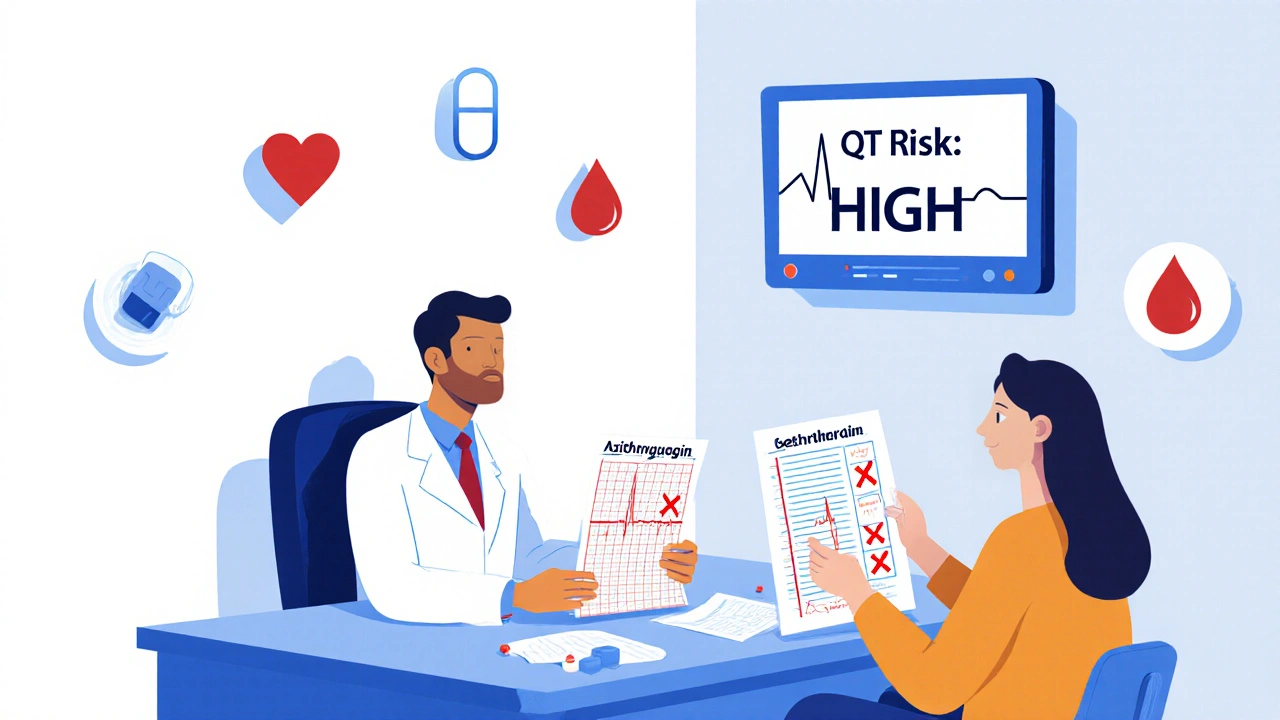
What to Do When Medications Cause Problems
What happens next depends on how serious your symptoms are.
- Mild cases: If your QTc is under 500ms and you’re not dizzy or passing out, your doctor might just adjust your dose and monitor you. Weekly ECGs, fixing low potassium, and avoiding caffeine or alcohol can be enough.
- Moderate cases: If you’re having palpitations but no danger signs, reducing the dose often helps. Studies show 60-70% of people feel better within 72 hours of lowering the medication amount.
- High-risk cases: If your QTc is over 500ms, you’ve had a fainting spell, or you’re in heart failure-stop the drug immediately. Hospitals follow strict guidelines to discontinue these meds right away. Delaying can be fatal.
Switching medications is often the best solution. For example:
- If you need an antibiotic and have heart risks, amoxicillin is much safer than azithromycin or levofloxacin.
- If thyroid meds are causing palpitations, lowering the dose to keep TSH between 0.5 and 2.0 mIU/L cuts symptoms in half.
- If you’re on citalopram and having heart issues, switching to sertraline often resolves the problem without losing antidepressant benefits.
In rare cases-like cancer patients on drugs that can’t be replaced-doctors may add a beta-blocker like metoprolol to protect the heart. Studies show this reduces arrhythmia risk by 45% without affecting treatment success.
Prevention: The Best Defense
The best way to avoid medication-induced palpitations? Stop them before they start.
Since 2024, 92% of U.S. academic hospitals have adopted a simple prevention protocol for high-risk drugs:
- Get a baseline ECG before starting the medication.
- Check potassium and magnesium levels within a week.
- Teach patients to recognize symptoms and when to call for help.
- Repeat the ECG within 7 days if your baseline QTc was already above 430ms.
Electronic health records now have built-in alerts. If you’re prescribed a drug that could prolong your QT interval and your ECG shows a risk, the system blocks the order unless the doctor overrides it with a reason. This has stopped an estimated 8,500 dangerous prescriptions every month.
There’s also a growing push for genetic testing. Some people have a natural variation in how they process certain drugs. For example, CYP2D6 poor metabolizers are 3.4 times more likely to have dangerous reactions to beta-blockers. While this testing isn’t routine yet, it’s coming fast.
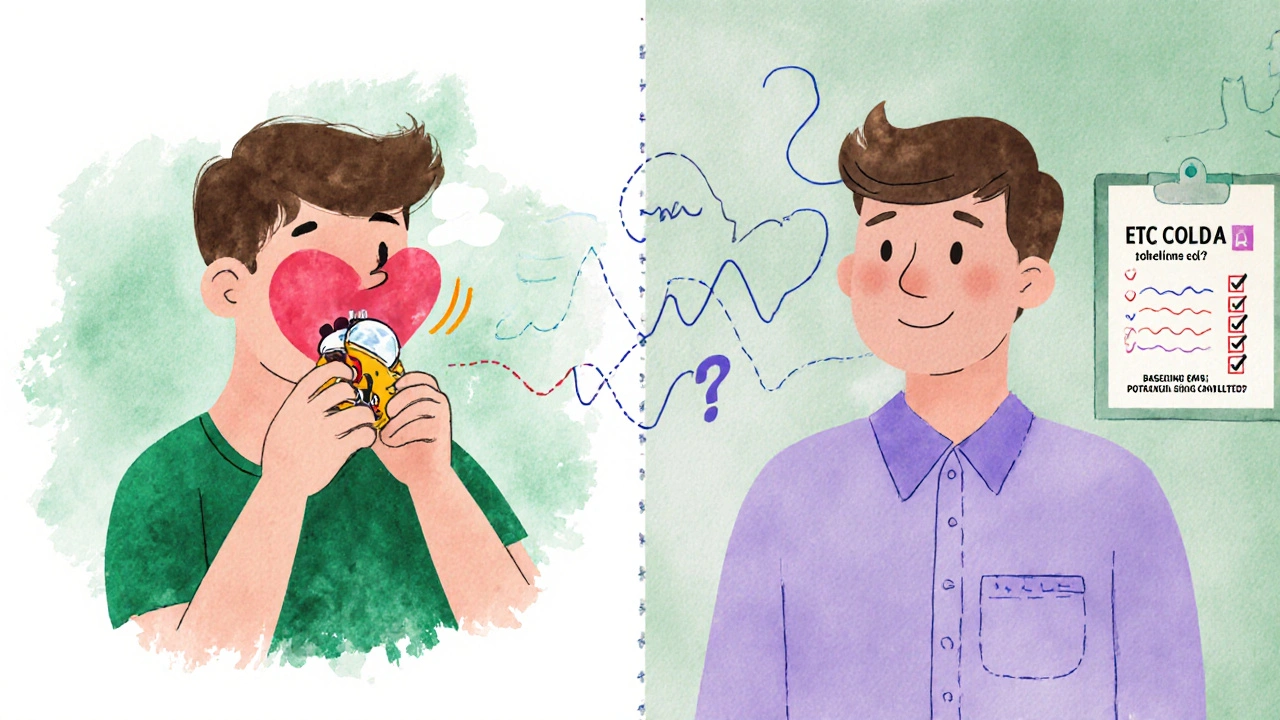
What You Can Do Right Now
You don’t need to wait for a doctor’s appointment to protect yourself.
- Keep a symptom journal: Write down when you feel your heart race, what you took that day, and your heart rate if you have a smartwatch or finger monitor. This helps your doctor connect the dots.
- Check your meds: Look up your medications on Drugs.com or MedlinePlus. Search for “cardiac side effects” or “QT prolongation.”
- Never combine QT-prolonging drugs: Don’t take azithromycin with an antidepressant or a decongestant unless your doctor says it’s safe.
- Ask before taking OTC: If you’re on heart meds or have a history of arrhythmia, ask your pharmacist before buying cold medicine or pain relievers.
- Know your numbers: If you’ve had a heart ECG before, know your QTc. If you don’t, ask your doctor for a copy.
One patient in her 60s had daily palpitations for months. She thought it was anxiety. Then she realized they started right after she began taking Sudafed for allergies. She stopped it. Within five days, the palpitations vanished.
Frequently Asked Questions
Can over-the-counter meds really cause heart palpitations?
Yes. Decongestants like pseudoephedrine (Sudafed) and phenylephrine are common causes. Even some antihistamines and herbal supplements like ephedra or bitter orange can trigger rapid heartbeat. Many people don’t realize OTC means safe-it just means you don’t need a prescription. That doesn’t mean they’re harmless to your heart.
How do I know if my palpitations are from medication or something serious like heart disease?
Timing matters. If palpitations started within days of beginning a new medication, that’s a strong clue. But you can’t rule out heart disease on your own. A 12-lead ECG and blood tests are needed to tell the difference. If you have chest pain, shortness of breath, dizziness, or fainting along with palpitations, seek care immediately-don’t wait to see if it’s the meds.
Is it safe to stop a medication if I think it’s causing palpitations?
Only if your doctor says so. Stopping some meds suddenly-like thyroid pills, antidepressants, or blood pressure drugs-can cause worse problems. Always talk to your provider first. They can help you taper safely or switch to a better alternative.
Can anxiety cause the same symptoms as medication-induced palpitations?
Yes, anxiety can make your heart race and feel like it’s pounding. But medication-induced palpitations often feel different-they’re more rhythmic, persistent, and don’t go away with deep breathing. If you’re unsure, track your heart rate with a smartwatch and note when symptoms happen. If they line up with when you take a pill, that’s a sign it’s drug-related.
Are older adults more at risk?
Absolutely. People over 75 are over three times more likely to develop dangerous arrhythmias from the same dose of a QT-prolonging drug compared to younger adults. Kidney and liver function decline with age, so drugs stick around longer. Many older adults also take multiple meds, which multiplies the risk. Always ask your doctor to review all your pills if you’re over 65 and experiencing heart symptoms.
What Comes Next
Medications are powerful tools-but they’re not harmless. As new drugs enter the market, we’re learning more about their hidden effects on the heart. The good news? We now have the tools to catch these problems early. If you’re taking any of the medications listed here and feel your heart acting up, don’t ignore it. Talk to your doctor. Bring your pill bottle. Write down your symptoms. You’re not overreacting-you’re being smart.
Prevention works. Monitoring works. Switching meds works. You don’t have to live with a racing heart. There’s a safer way-and you have the power to find it.

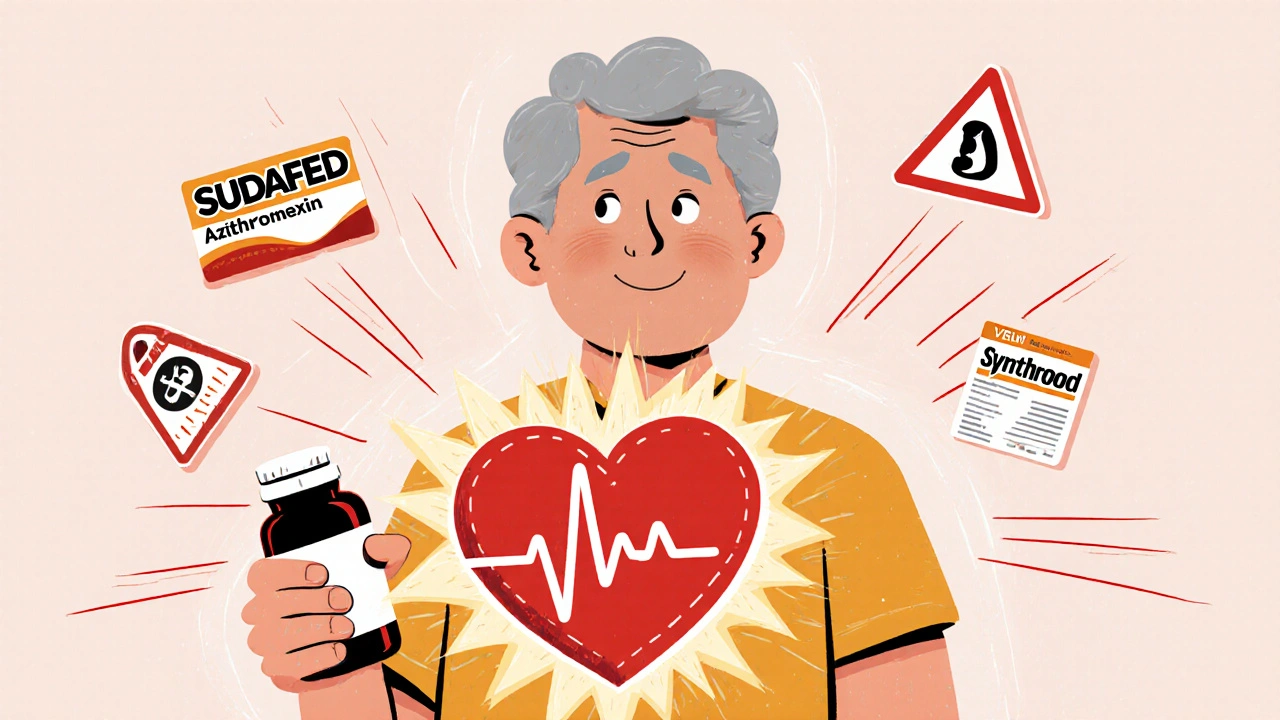

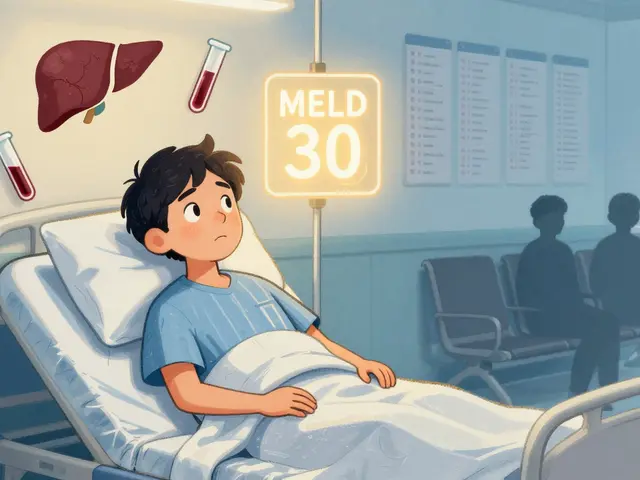
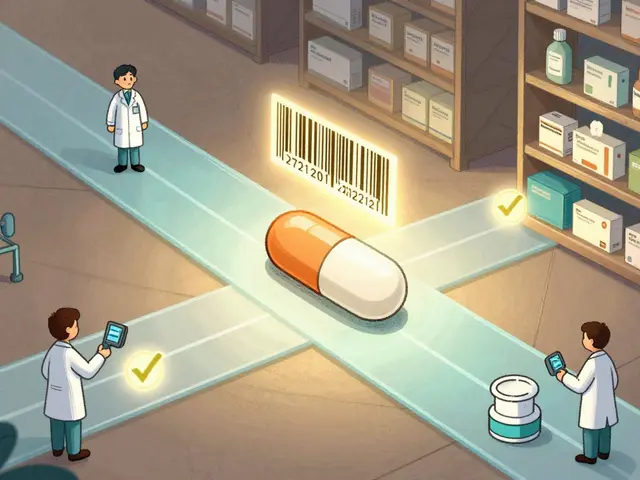


Amina Kmiha
November 3, 2025 AT 04:11 AMI KNEW IT. 🤯 Big Pharma is hiding this. They don't want you to know that your Sudafed is slowly turning your heart into a jackhammer. They're making billions off your arrhythmias while you're scrolling TikTok thinking it's just 'anxiety'. The FDA? Bought and paid for. 🚨💊 #StopTheCoverUp
Ryan Tanner
November 3, 2025 AT 06:21 AMThis is actually super helpful! I had no idea my Zithromax could do this. I’ve been feeling weird after my last round of antibiotics - now it makes sense. Gonna talk to my doc about switching to amoxicillin next time. Thanks for the clarity! 💪❤️
Jessica Adelle
November 4, 2025 AT 03:21 AMThis article is an absolute disgrace. You are encouraging Americans to disregard their prescribed medications without consulting a licensed physician. This is not medical advice - this is reckless, dangerous, and utterly irresponsible. In my country, we trust science, not internet fearmongering. Shame on you.
Sai Ahmed
November 5, 2025 AT 20:33 PMThey say it's the meds. But what if it's the 5G towers? Or the microchips in the vaccines? I took azithromycin and my heart went nuts. But I also got the booster that same week. Coincidence? Or is the algorithm watching my pulse? I don't trust the ECG. They can fake it.
Albert Schueller
November 6, 2025 AT 23:17 PMI read this whole thing and all I can say is... wow. The fact that they didn't mention that SSRIs are literally designed by the CIA to destabilize the population is just... shocking. Also, typo: 'QTc' is spelled wrong on page 3. And why is Ozempic even legal? It's a weight loss drug that turns people into zombies with racing hearts. Someone needs to sue.
Ted Carr
November 8, 2025 AT 17:23 PMSo let me get this straight. You wrote a 2,000-word essay on how your heart might race after taking a cold pill... and you didn’t once mention that the real problem is that we’ve turned our bodies into vending machines for pharmaceuticals? We don’t need more lists - we need to stop treating health like a spreadsheet.
Rebecca Parkos
November 9, 2025 AT 12:29 PMI had this happen last year. I was on citalopram and started taking Sudafed for a cold - and I swear my heart was trying to punch its way out of my chest. I went to the ER. They did the ECG, found my QTc at 510, and told me to stop both immediately. I’m alive because I listened. Don’t be like me - don’t wait until you’re shaking in a hospital gown. Call your doctor TODAY. Seriously. Your heart matters.
Bradley Mulliner
November 9, 2025 AT 22:06 PMThe author clearly has no idea what they're talking about. This isn't 'medication-induced' - it's just people being lazy and not taking responsibility for their own health. If you're on 12 different pills and your heart races, maybe you should stop being a hypochondriac and get off the couch. Also, the data here is cherry-picked. I've seen 300 patients on azithromycin - zero arrhythmias. This is fear porn dressed as medicine.